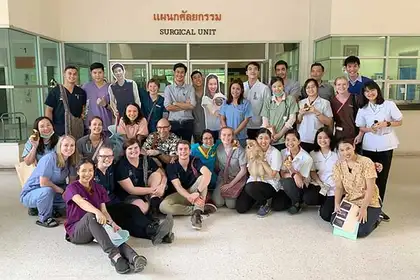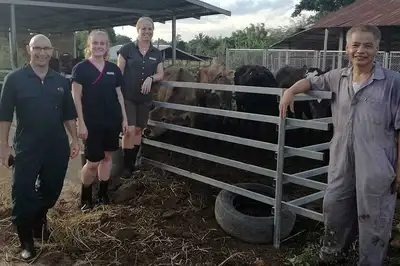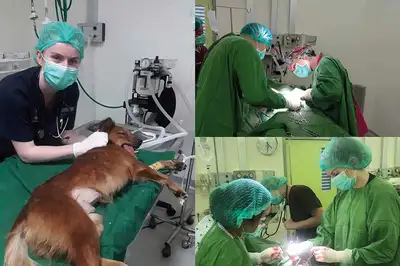
Staff and students from Massey and the Faculty of Veterinary Medicine at Khon Kaen University outside the surgical unit.
Massey University veterinary students have experienced living and learning in South East Asia – treating exotic animals and adapting to a unique culture.
The six-week study programme gave 10 final-year Bachelor of Veterinary Science students an opportunity to experience veterinary education, practice and culture in Thailand.
Hosted by the Faculty of Veterinary Medicine at Khon Kaen University the tour is part of the Massey Global Citizen Programme and is funded by the Prime Minister’s Scholarship for Asia in conjunction with Education New Zealand.
The programme included internships at the university’s teaching hospital, a visit to the Khon Kaen Zoo, and a placement at Kwuncum Veterinary Hospital in Bangkok to learn under Dr Sompoth Weerakhun, considered one of the foremost exotic animal experts in Thailand.

Students on large animal rotation, visiting a local dairy co-op learning about testing somatic cell counts, quality and bacterial contamination of milk.
A different way of doing things
Fifth-year student Alisdair Eddie says the cases they observed were different to those they have seen in New Zealand. “There are quite a different range of diseases in Thailand and animal husbandry is approached very differently,” Mr Eddie says. “Buddhism is the major religion in Thailand. It definitely has an influence on the way animal treatment is approached, with the idea that life in any form is better than none and what is happening to the animal is God’s will.
“One veterinarian expressed the view that euthanasia was almost giving up in the eyes of many clients and they thought a vet was incompetent if they could not treat the animal and chose to euthanise. It was interesting to see how their culture and beliefs affect animal husbandry and welfare and how veterinarians have adapted their practices to deal with these differences.”
School of Veterinary Science deputy head Associate Professor Wendi Roe says exposure to veterinary work in a developing country gives students greater insight into the challenges others face. “It was exciting to watch how well our students adapted to the situations they were faced with,” Dr Roe says. “This was a great learning opportunity for them, and I was impressed by their positive attitudes and ability to apply their knowledge and skills in unfamiliar and sometimes challenging circumstances.”
She says the trip strengthened and extended engagement with Khon Kaen University staff and students. “The students were also ambassadors for our school, showing the strength of their education at Massey and resources available in New Zealand. It will certainly raise awareness among Thai veterinary students of the opportunities for postgraduate study in New Zealand.
“But we hope it also goes the other way and has fostered an ongoing interest in this area of work with these countries, particularly in OneHealth,” she says.
At the conclusion of the internship, each student presented a small research topic or clinical case to Khon Kaen’s staff and students.

Students assisting at Khon Kaen University with a desexing programme for strays.
Test of resilience
Study programme coordinator Dr Lachlan McIntyre says the study tour has been a test of resilience to potentially challenging experiences. “Some of the students have surprised themselves with what they were able to gain from this very intensive study programme,” he says. “Students all kept a daily diary of experiences with a significant reflective component. It enabled the students to consider how cultural, religious and socioeconomic factors influence veterinary care in developing countries and how similar factors may come into play even when working as a veterinarian in New Zealand.”
Selection into the programme was based on academic and non-academic factors, including resilience to potentially challenging experiences related to animal production and health in a South-East Asian country.
“This tour allowed them to identify and acknowledge the difficulties faced, and the adaptations and considerations needed, to be successful in under-resourced environments,” Dr McIntyre says.
Fifth-year student Nicole Jackson says one particularly challenging barrier was language. “In the clinic, many of the clients did not speak English and so the consults were in Thai,” she says. “I got around this by making friends with Thai students and getting them to summarise and translate for me afterwards, Outside of the clinic I used translation apps and learnt basic phrases to talk with locals.”
The Prime Minister’s Scholarships for Asia (PMSA) is an outbound scholarship programme funded by the New Zealand Government. The scholarships are awards to support top undergraduate or postgraduate students wanting to undertake study or research in Asia. Visit the Global Citizen website for further information, and to find out more about other international opportunities available to Massey students.